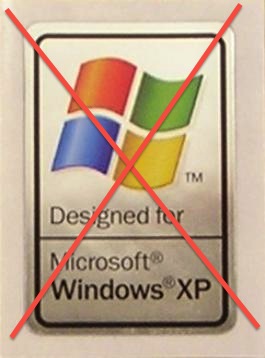Apple Dropping Support for Windows XP?

Even with Apple’s famed Macintosh product line becoming more and more popular and well-supported each and every day, there is absolutely no denying the fact that Microsoft’s Windows operating system easily surpasses the popularity of Mac OS X several times over. But even with the improvements made in the 2009 release of Windows 7 a great many Windows users have opted to stay faithful to their beloved and quite obviously highly-trusted Windows XP installations.
That’s right; a decade after its release, XP is still the most popular operating system in existence with an estimated marketshare of over sixty percent. Now, with the operating system being over a decade old there should be no surprise that some developers find the platform to be outdated and a burden to continue developing for. But with the overwhelming usage surprisingly few developers have actually abandoned the OS completely.
However it now is becoming apparent that Apple has made the decision to not support Windows XP in their upcoming iCloud service. Tom’s Hardware recently pointed out a statement made in Apple’s press materials that says “using iCloud with a PC requires Windows Vista or Windows 7; Outlook 2010 or 2007 is recommended for accessing contacts and calendars.” Notice the lacking mention of Windows XP.
When I first saw this story break, I must admit that I thought it was a bit silly of a decision for Apple to make. You see, after reading and watching a handful of video clips from Apple’s recent World Wide Developers Conference event in San Francisco, it seemed pretty apparent (at least to me) that Apple’s goal with iCloud was to get as many users on board as possible. Doing so would, after all, force users to indirectly take a better look at and possibly purchase Apple hardware. With MobileMe (previously known as .Mac) not having done anywhere near as well as the company quite obviously wanted, it would only seem natural that this third attempt at generating a presence in the cloud computing scene would rest almost entirely on Apple’s ability to make their product not only attractive, but available to as many users as possible. So why wouldn’t the company put more focus on XP?
Simply put, I think that users of a decade-old operating system simply aren’t the kind of folk that Apple wants to appeal to. Let’s admit it; anyone using such a dated OS is inevitably going to be resistant to change or implementing a new service. And because of the fact that Windows 7 has become known for offering more function with lesser system resource consumption, there really isn’t that much justification – short of software compatibility, in limited cases – for users to stick with XP.
At the same time, I for one believe that Apple stands to gain from not supporting XP. That said, if iCloud becomes enough of a standard over the next year or so I could easily see where XP users would re-assess their choice in operating system and computer. One likely product line that would come up for consideration? The Macintosh.
But really, I think that the real reason that XP doesn’t appear to be a focus for Apple is the fact that it doesn’t have enough integrated features for iCloud to take advantage of. Windows 7 and Mac OS X both have their own somewhat feature-rich photo applications. XP? None. And the same can be said for many of the features iCloud seems to be heading in the direction of. So why wouldn’t it make sense for Apple to vest so much effort in bringing an outdated OS up to speed for their product? Short answer; it wouldn’t.